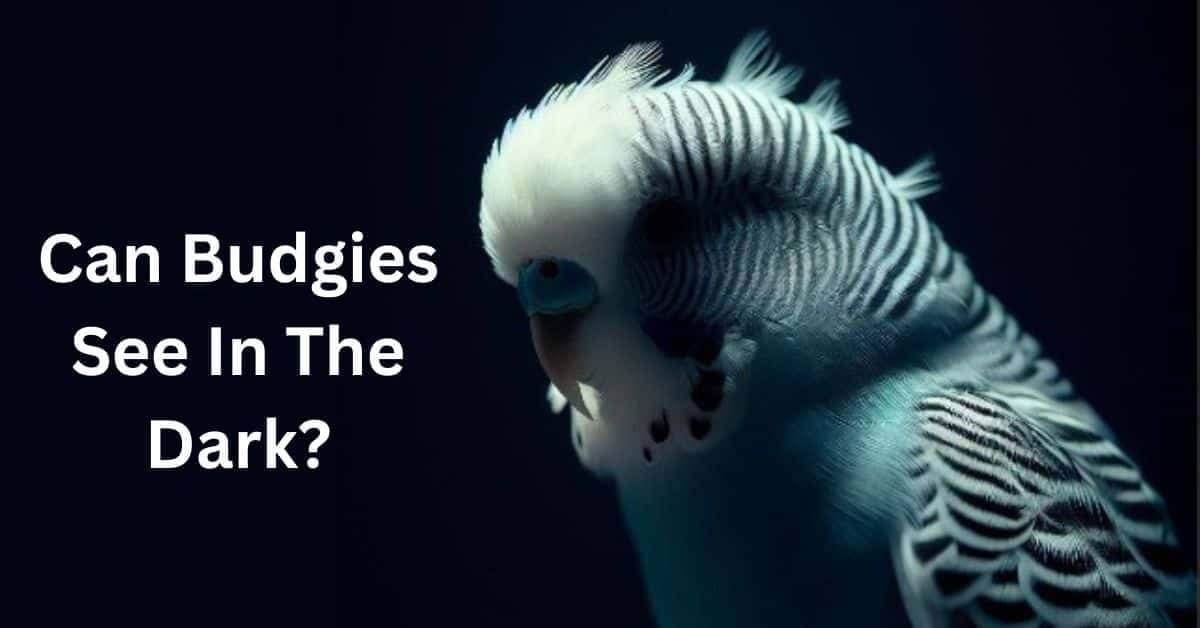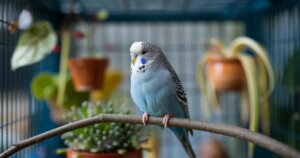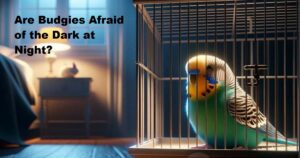Can Budgies Really See in the Dark?
Have you ever wondered: Can budgies see in the dark? Well, Budgies are not the best at seeing in the dark. It kinda scares them, and they might try to hide, thinking there might be something sneaky around.
But, when the sun’s up, they’ve got no trouble seeing everything clear as day. If you’ve got one of these feathery friends at home, make sure they’ve got a cozy, dark spot to snooze at night. Putting a cover over their cage can make them feel safe and snug.
And, if your budgie has to hang out in a dark room during the day, a bright light that feels like sunlight, set on a timer, can really help them out.
Can Budgies See In The Dark?

I have budgies, and I checked my budgie. The budgie, like most birds, can’t see in total darkness. Budgies have vision adapted to daylight conditions, similar to humans. They rely on their keen eyesight to navigate, find food, and avoid predators during the day.
However, their vision diminishes as light levels decrease, making it difficult to see in the dark. Budgies have a higher number of rod cells in their retinas compared to humans. Rod cells are specialized photoreceptor cells that help detect light and motion.
Moreover, this adaptation allows them to quickly perceive changes in light levels, which can be crucial for spotting potential threats in their natural environment.
In dim lighting conditions, such as at dusk or dawn, budgies can still make out shapes and movements to some extent. They may be able to locate perches or navigate within their cage during these low-light periods. However, they will struggle to see anything once it becomes truly dark.
As pet owners, it’s essential to provide a safe and secure sleeping environment for budgies. They need a dark, quiet place to sleep at night, mimicking their natural circadian rhythm. To avoid any accidents, ensure no obstacles or hazards in their sleeping area.
How Budgies See in Different Lighting Conditions?
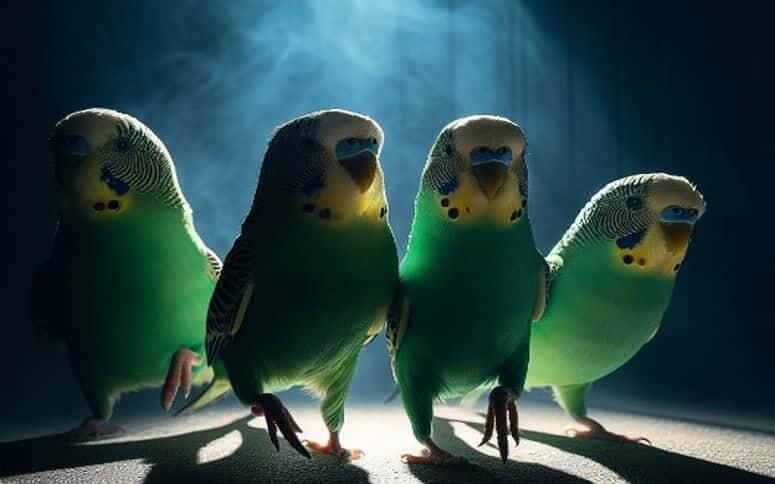
Budgies have excellent eyesight during the day and can clearly perceive colors, shapes, and movements. Their vision is optimized for bright settings, thanks to their ability to detect a wide range of colors, including ultraviolet light that is invisible to the human eye.
In different lighting conditions, budgies’ visual adaptation allows them to adjust and perceive their surroundings effectively.
Here’s a breakdown of how budgies see in different lighting conditions:
- In the morning: As the sun rises, budgies’ eyes gradually adjust to the increasing light intensity. They can start perceiving their surroundings in more detail as their retinas adapt to the changing brightness.
- During the day: Budgies’ eyes are optimized for daylight, allowing them to identify objects and navigate their surroundings precisely. Their keen eyesight helps them spot seeds, fruits, and other food sources from a distance.
- At night: Unlike some nocturnal animals, budgies’ night vision is not their strongest suit. Their eyes struggle to capture details and perceive objects in dimly lit or dark conditions. They rely on other senses, such as hearing, to navigate and feel secure.
Tips For Keeping Budgies In Low Light Conditions
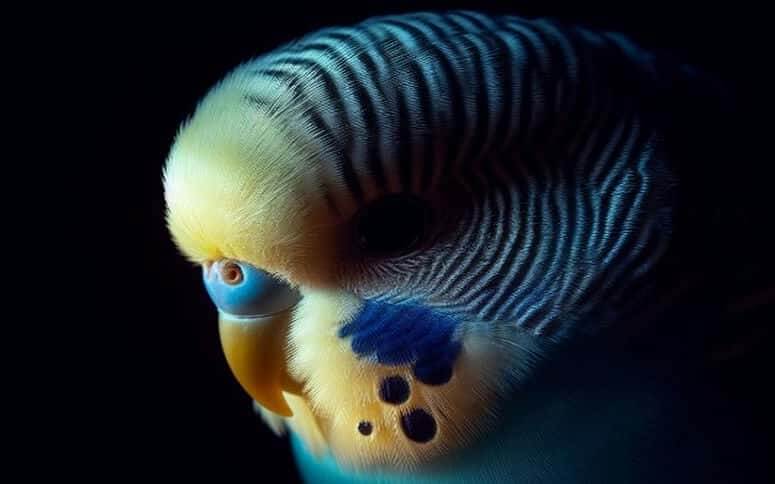
To ensure the well-being of your pet budgie, it is vital to consider their needs even in low light conditions. While budgies do not see well in the dark, there are a few tips you can follow to provide a comfortable environment for them:
1. Providing Adequate Lighting In Their Enclosure
Budgies thrive in natural light, but it is vital to provide adequate artificial lighting if kept in a low-light environment. You can do this by:
- Placing the bird’s cage near a window to allow some natural sunlight to filter in during the day.
- Using a full-spectrum light bulb specifically designed for birds, which mimics natural sunlight and provides the necessary UV rays.
- Installing a light timer, the artificial light turns on at dawn and off at dusk, replicating the natural day-night cycle.
Ensuring your budgie’s enclosure has sufficient lighting can help them maintain their natural circadian rhythm and keep them active and healthy even in low light conditions.
2. Avoiding sudden changes in lighting conditions
Budgies are sensitive creatures and sudden changes in lighting conditions can be stressful for them. It is essential to avoid abrupt transitions from light to darkness or vice versa.
Here are a few tips to prevent this:
- Keep the lighting consistent throughout the day. Avoid turning off all the lights in the room suddenly, as this can startle the budgie and create stress.
- If you need to dim the lights in the evening, do it gradually to allow the budgie to adjust.
- Use blinds or curtains to control the amount of natural light entering the room and create a gradual transition from day to night.
By avoiding sudden changes in lighting conditions, you can help your budgie feel more secure and reduce unnecessary stress.
Training Budgies For Low Light Situations

It’s essential to use positive reinforcement techniques to train budgies for low-light situations. These techniques involve rewarding the budgie for desirable behavior and gradually increasing exposure to lower light conditions.
Here are some steps you can follow to train your budgie:
- Start by dimming the lights in the room where your budgie is kept. This could be done in the evening when your budgie is already settled and ready to rest.
- Observe your budgie’s behavior and reactions to the dim lighting. Reward the bird with a treat or praise if it appears calm and relaxed.
- Depending on your budgie’s comfort level, gradually dimming the lights over several days or weeks. Monitor their response and adjust the light levels accordingly.
- As your budgie becomes more accustomed to low light conditions, you can introduce additional stimuli, such as gentle music or a nightlight, to create a soothing environment.
- Remember to provide your budgie a dark, quiet, and somewhat secluded area. Covering the cage at night can help mimic natural sleeping conditions and ensure your budgie gets enough rest.
Positive reinforcement techniques and gradual exposure to lower light conditions can help your budgie feel more comfortable and safe in the dark.
However, it’s important to note that each budgie is unique, so be patient and adjust the training process based on your bird’s individual needs and preferences.
Best Practices For Caring For Budgies in Low-light Situations
- Provide a quiet and dim environment at night to mimic natural conditions for budgies.
- Avoid sudden changes in lighting to prevent stress and disorientation.
- Use a small red or blue night light to provide a soft source of illumination if needed.
- Avoid completely dark environments to prevent budgies from getting scared or disoriented.
- Maintain a consistent daily routine with proper lighting during the day and a quiet, dim environment at night for optimal budgie health and well-being.
Also read- Why Budgie Died With Eyes Open?
Frequently Asked Questions On Can Budgies See In The Dark
What Does a Budgie’s Vision Look Like?
Budgies have remarkable vision during the day. They can see a range of colors, including ultraviolet light, which humans can’t see. This ability helps them find food, recognize mates, and navigate their environment. However, their night vision is limited, and they struggle to see in the dark.
Should I Cover My Budgie At Night?
Budgies do not see well in the dark, so providing a dark, quiet, and secluded area is recommended for them to sleep at night. However, if you are unsure of their reaction, it is best to cover the cage to ensure their well-being.
Are Budgies Afraid of the Dark?
Yes, budgies can be afraid of the dark. Since their night vision isn’t great, they might get frightened by unfamiliar sounds or movements they can’t see. This fear comes from their natural instinct to be wary of predators.
How Can I Tell If My Budgie Is Afraid Of The Dark?
If your budgie seems restless at night or makes scared noises, they might be afraid. Providing a comfortable sleeping environment can help.
Do Budgies Need Light At Night?
A small night light is okay if it helps your budgie feel safe. Just make sure it’s not too bright and doesn’t disturb their sleep.
Can Budgies Navigate Their Cage In The Dark?
Budgies have a good memory of their space, so they can navigate their cage to some extent. But, it’s best to avoid rearranging their cage often, as this can confuse them at night.
What Are The Signs Of a Well-rested Budgie?
A well-rested budgie is active, happy, and engages with their surroundings. They’ll eat well and be keen to play and interact.
Sum Up
So, here’s the scoop: budgies can see super well when the sun’s up but not so much in the dark. They get a bit scared if they hear or see something they don’t know because they can’t see it properly.
It’s a good idea to give them a calm, dark spot to sleep at night. And if you’re not sure how they’ll react, maybe cover their cage to keep them feeling safe.
In short, our feathery friends don’t have the best eyesight at night, so they use their other senses to stay out of trouble.
Oh, and don’t forget to check out the video below for some handy tips on what to do for your budgie at night. And hey, if you found this helpful, why not share it around?
Hello Dear, I'm Poli Kolymnia, owner of many birds (including budgies).
With a deep passion for these feathered companions, I'm here to share my expertise and extensive knowledge on birds care.
My articles cover essential topics like diet, housing, care, and health, providing practical tips to help you create a happy and thriving environment for your birds.

